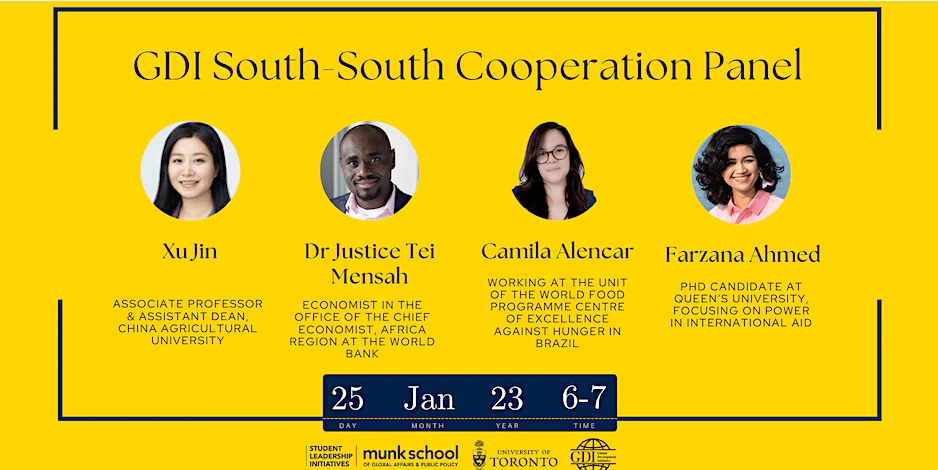 On the last Wednesday of January, the 25th, the World Food Programme (WFP) Centre of Excellence against Hunger Brazil participated on the Global Development Initiative (GDI) South-South Panel, a student-led forum of the Munk School of Global Affairs and Public Policy of the University of Toronto. The online event focused on the benefits and challenges of South-South cooperation while examining various forms of implementation, and its potential for poverty reduction.
On the last Wednesday of January, the 25th, the World Food Programme (WFP) Centre of Excellence against Hunger Brazil participated on the Global Development Initiative (GDI) South-South Panel, a student-led forum of the Munk School of Global Affairs and Public Policy of the University of Toronto. The online event focused on the benefits and challenges of South-South cooperation while examining various forms of implementation, and its potential for poverty reduction.
In the first presentation, Camila Alencar, from the Centre of Excellence’s Programme team, introduced the organization’s work and its objectives, as well as the role in the South-South Cooperation of the Centre through study visits, technical workshops, knowledge management, and strategy and public legislation support. “Last year, more than 90% of WFP Country Offices engaged in South-South Cooperation, up from the 60% engagement we had 5 years ago. So, there is a huge increase and interest in the implementation of this sort of activities”, said Camila.
Representing the China Agricultural University, Xu Jin, associate professor and assistant to the Dean presented the work of the University with international cooperation and it’s benefits to all countries involved. As an example, she presented a project in Tanzania, where both countries engaged in agricultural technology transfer and experience sharing. “We want to see what experiences can be relevant to African countries in the context of agricultural development, food security and also we want to contribute to poverty reduction”, complemented Jin.
The discussion also talked about successful experiences, good practices of cooperation among developing countries and how to improve this process. In addition, he event counted with the participation of Dr Justice Tei Mensah, economist of the World Bank, and Farzana Ahmed, PhD candidate in the Queen’s University.
South-South Cooperation to a better future
South-South Cooperation refers to the sharing of knowledge and resources between middle-income countries with the aim of identifying effective development practices. The principles of South-South cooperation are equality, and sovereignty, which emanate from the historical and lived experiences of countries from the Global South.
The Centre of Excellence offers remote and face-to-face technical support to guarantee the continuity of these activities with the countries. Since 2019, the Centre of Excellence has offered remote assistance through the Virtual Study Visit: Brazil, providing technical and advisory services, promotion of partnerships, knowledge production and advocacy support.




